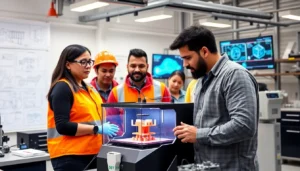Table of Contents
ToggleIn a world where your coffee machine might soon be smarter than you, emerging technologies in AI are redefining what’s possible. From self-driving cars to virtual assistants that can predict your next snack craving, the landscape is evolving faster than a cat video goes viral. These advancements aren’t just cool; they’re transforming industries and reshaping daily life.
Overview Of Emerging Technologies AI
Emerging technologies in AI transform various industries and enhance daily life. Companies leverage machine learning, natural language processing, and robotics to improve efficiency. Enhanced data analytics enables businesses to gain insights from enormous data sets, driving informed decisions.
Self-driving cars utilize AI to navigate complex environments. These vehicles rely on cameras and sensors to detect obstacles, ensuring safer travel. Predictive virtual assistants improve customer service by anticipating user needs and automating tasks.
Healthcare also benefits from AI advancements. Medical professionals employ AI algorithms to analyze medical images, achieving faster and more accurate diagnoses. Wearable devices track health metrics, allowing for personalized wellness programs.
In finance, AI streamlines operations and reduces fraud risks. Automated trading systems analyze market trends, enabling timely investment strategies. Chatbots address customer inquiries, improving user experiences while lowering operational costs.
Security systems increasingly integrate AI for real-time threat detection. These systems process vast amounts of data, identifying irregular patterns that indicate potential breaches. Smart home technologies also enhance safety by utilizing AI to monitor homes and alert homeowners to unusual activities.
Education sees the emergence of AI-driven personalized learning platforms. These platforms adapt to individual learning styles, improving student engagement and outcomes. Virtual tutors provide additional support outside classroom hours, making education more accessible.
Emerging technologies continue to evolve, creating possibilities across various sectors. Companies investing in AI research foster innovation, driving both economic growth and societal progress.
Key Features Of AI Technologies
Emerging AI technologies showcase significant advancements, driving efficiency and innovation across various sectors. Innovations like machine learning and natural language processing are at the forefront, transforming how industries operate.
Machine Learning Advancements
Machine learning demonstrates remarkable capabilities in predictive analytics and data processing. Algorithms now analyze vast data sets quickly, enabling organizations to make data-driven decisions. Enhanced models improve accuracy in tasks such as recommendation systems, fraud detection, and customer insights. As a result, companies utilize these advancements to optimize operations and elevate user experiences. Increased access to data and computing power facilitates ongoing refinement of machine learning techniques, further promoting efficiency.
Natural Language Processing Developments
Natural language processing (NLP) significantly enhances user interaction with machines. NLP systems can now comprehend, interpret, and generate human language with increasing precision. Chatbots and virtual assistants leverage this technology to provide more intuitive customer interactions. Current developments focus on multilingual capabilities, allowing broader accessibility for users worldwide. Improved sentiment analysis tools enable businesses to better understand customer feedback, tailoring products and services accordingly. Overall, these advancements in NLP create more engaging, effective communication between humans and AI systems.
Applications Of Emerging Technologies AI
Emerging technologies in AI are reshaping industries with innovative solutions that enhance efficiency and user experiences.
Healthcare Innovations
AI plays a crucial role in transforming healthcare. Algorithms analyze medical data, providing quicker and more accurate diagnoses. AI-driven systems assess patient conditions, leading to personalized treatment plans. Wearable devices collect health metrics, enabling individuals to monitor wellness continuously. Advanced imaging techniques utilize AI to identify diseases earlier, improving patient outcomes. Telemedicine platforms often integrate AI for streamlined consultations, enhancing accessibility for patients in remote areas.
Smart Home Solutions
Smart home devices harness AI to create more intuitive living environments. Voice-activated assistants manage daily tasks, allowing users to control appliances with simple commands. Security systems equipped with AI can detect intrusions, alerting homeowners in real-time. Thermostats adjust temperatures based on user preferences, promoting energy efficiency. Lighting systems learn user behavior, optimizing illumination throughout the day. Connected home gadgets communicate seamlessly, enhancing overall convenience and comfort.
Financial Services Automation
In finance, AI automates processes, significantly enhancing operational efficiency. Chatbots assist customers with inquiries, providing instant support 24/7. Algorithms detect fraudulent activities by analyzing transaction patterns, ensuring safer transactions. Automated trading systems execute trades at optimal times, enhancing profit potential. Risk assessment models leverage AI for accurate credit scoring, improving lending decisions. These advancements lead to smoother user experiences while reducing operational costs for financial institutions.
Challenges And Ethical Considerations
Rapid growth in AI technology presents significant challenges and ethical considerations. Privacy concerns arise due to data collection methods. Organizations gather vast amounts of personal information, which raises questions about consent and the potential for misuse. Transparency also plays a crucial role; users often lack clarity on how AI systems make decisions.
Bias in AI systems can lead to discriminatory outcomes. Algorithms trained on biased data reflect those biases, impacting vulnerable populations. For example, predictive policing systems can disproportionately target specific communities based on historical crime data. Addressing algorithmic fairness remains pivotal for developers and organizations alike.
Accountability emerges as another pressing issue. Determining who is responsible for AI decisions complicates matters, especially in scenarios involving accidents or malfunctions. Questions about liability need resolution to ensure accountability mechanisms exist.
Moreover, the impact of automation on employment sparks debate. Job displacement concerns arise as AI systems automate tasks traditionally performed by human workers. Society faces the challenge of transitioning displaced workers to new roles while maintaining economic stability.
Ethical deployment of AI technologies is paramount. Organizations must implement frameworks that prioritize ethical considerations during development and deployment phases. Collaboration between technologists, ethicists, and policymakers fosters responsible growth in AI.
Ultimately, firms must balance innovation with ethical implications as they navigate the evolving landscape of AI. They face the responsibility to ensure that emerging technologies enhance societal benefits while minimizing harm.
Future Trends In AI Technologies
Artificial intelligence continues to evolve, leading to numerous exciting trends. One significant trend focuses on the increased integration of AI with the Internet of Things (IoT). Smart devices now communicate seamlessly, resulting in enhanced automation and data collection capabilities.
Personalized experiences are on the rise, driven by advancements in machine learning. Algorithms analyze user behavior to tailor recommendations, improving engagement across platforms. Enhanced natural language processing allows more effective interactions between users and devices, paving the way for more intuitive virtual assistants.
In healthcare, AI predicts patient outcomes more accurately. Systems analyze vast amounts of data to identify risk factors and suggest proactive measures. Telehealth solutions are gaining popularity as they leverage AI for efficient patient management, notably improving access to care in underserved areas.
The finance sector adapts rapidly as well, utilizing AI for real-time analytics. Automated systems manage transactions, reducing human error and accelerating processes. Fraud detection methods become more sophisticated, utilizing AI to identify patterns and anomalies in financial activities.
Moreover, AI’s role in cybersecurity grows stronger. Innovative algorithms identify and respond to threats faster than human teams, enhancing overall security. The importance of AI in education cannot go unnoticed either, as adaptive learning technologies allow teachers to customize curriculum based on student performance.
Ethics in AI continues to spark significant discussions. Developers prioritize transparency to help users understand how AI systems function. Efforts to minimize bias in algorithms are underway, aiming for inclusivity and fairness in AI applications. As these trends unfold, organizations must remain aware of the balance between innovative solutions and ethical responsibilities in deploying AI technologies.
The rise of emerging AI technologies is reshaping industries and enhancing daily life in unprecedented ways. As businesses harness the power of machine learning and natural language processing, they’re unlocking new efficiencies and insights that drive innovation.
However, with these advancements come significant ethical challenges that demand attention. Privacy concerns and potential biases in AI systems highlight the need for transparent practices and responsible deployment. Striking a balance between technological progress and ethical considerations will be crucial as society navigates this rapidly evolving landscape.
Ultimately, the future of AI holds immense promise, and its successful integration into various sectors hinges on a commitment to ethical standards and accountability. As organizations continue to innovate, they must prioritize the societal implications of their technologies to ensure a positive impact.







